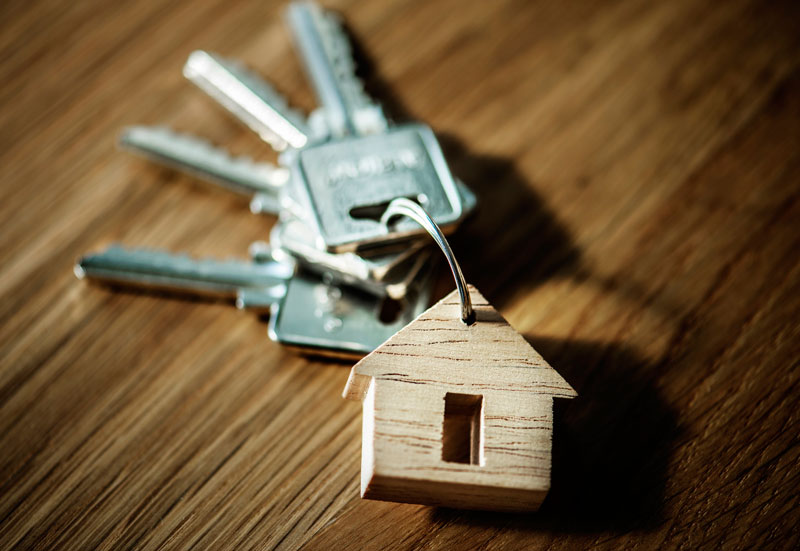What Are the Ongoing Expenses?
Expenses may include mortgage costs, annual property taxes, home and renters insurance, plus any monthly fees, such as Homeowners Association (HOA), landscape maintenance, pest control or pool service. Set aside approximately one percent of the home’s value annually for deferred maintenance costs, and reach out to a tax advisor who can consult on the tax implications of owning a rental property.
Which Property Should You Buy?
Start by checking the local home rental rates in the area, then search for a property that can cover all or the majority of your mortgage (if you will carry one on the property). Find a property that’s easy to rent consistently to minimize paying out-of-pocket with vacancies.
How Much Will it Cost to Prep for New Tenants?
Once the property is purchased, fix any issues that surfaced during the inspection and get the home ready to rent. This may include painting, fresh carpet or refinishing floors, changing the locks and thoroughly cleaning the home from top to bottom. If you need a referral to a contractor, plumber, electrician or other professional, or even a referral to a great cleaning service, give me a call!
How Will You Find Tenants?
If you plan to find tenants on your own, run an ad that targets your ideal renter. Remember to run a credit check and a background check, as well as verify their references to ensure they’re responsible. Rental agencies charge a fee for their services; however, they have the knowledge and experience to find the right people to rent your property and will deal with the tenants on your behalf.
Will You Have to Purchase Property Insurance?
Rental property insurance protects you and your investment and often covers property damage, lost rental income or rental default, and provides liability protection. Riders may include guaranteed income insurance, flood insurance and coverage for emergencies. Maintain an emergency fund of 20 percent of the value of the property to cover anything that isn’t protected by insurance.
What Are the Legal Considerations?
Learn the federal and state laws regarding your responsibilities as a landlord to prevent any potential legal issues later on.

Thinking of Purchasing an Investment Property?
Give Me A Call for A Referral to A Real Estate or Tax Professional
To Buy (An Investment Property) or Not to Buy?
Advantages
- Build wealth. Investment properties allow your money to work for you. You’ll build wealth as the property increases in value.
- Create passive income. Ideally, the rent you collect each month will exceed expenses, which may provide you with a supplemental income.
- Diversify your investments. Real estate is often seen as a “safer” investment than stocks and bonds, partially because it’s a tangible asset. Additionally, people will always need a place to live, which creates a consistent demand for rentals.
- Have others cover your mortgage. If you purchase a multi-unit property, you can live in one unit and rent the others. The money you collect may be enough to cover your mortgage principle, insurance and taxes.
- Capitalize on tax advantages. You may be able to write off property taxes, insurance costs, interest, depreciation and more.
- Have a vacation home to enjoy with family and friends. Spend time with your loved ones in your favorite locale for a few weeks, and then rent it out the rest of the year. Not only will you save money on accommodations; over time, the investment may pay for itself.
Disadvantages
- Liability. Ensuring the property is properly maintained and meets building codes and regulations is your responsibility.
- Unexpected expenses. Although you may plan for regular maintenance, unexpected repairs may happen, such as a plumbing backup, a faulty roof, etc. Your deferred maintenance savings is a must.
- Bad tenants. Evicting a bad tenant can be an expensive and lengthy process, so be sure to understand your state laws related to tenancy and eviction.
- Vacancy. If the property isn’t rented, you won’t make money and may even lose money.
First-Time Buyers: Should You Consider Buying an Investment Property First?
Some first-time buyers are purchasing an investment property before they buy a home to live in. Here’s why:
- They find it easier to cut costs and save. Many first-time buyers are young and don’t have dependents, so it’s often easier for them to live on less while they save.
- They’re more open-minded about purchasing a distressed property to fix up. Once the property is renovated, they may rent it out and use part of the money collected to save for a down payment.
- To create a passive, second source of income. Investment properties allow them to take the money earned and reinvest it in the property or pay off their debt.
Keep in mind: If you’re purchasing an investment property, you may need a down payment of more than 20 percent. Speak to your real estate agent for more information. If you’re not currently working with an agent, I can refer you to one!



